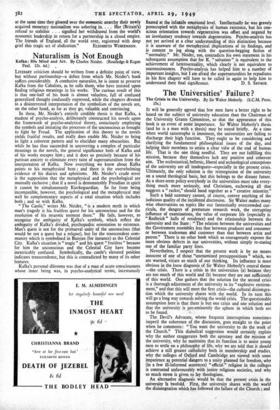Naturalism is Not Enough
Kafka : His Mind and Art. By Charles Neider. (Routledge & Kegan Paul. 12s. 6d.)
LITERARY criticism should be written from a definite point, of view, but without partisanship—a defect from which Mr. Neider's book suffers considerably. A combative naturalist, he is intent to preserve Kafka from the Cabalists, as he calls them, who have insisted upon finding religious meanings in his works. The curious result of this is that one-half of his book is almost valueless, full of confused generalised thought confusedly expressed, while the chapters devoted to a disinterested interpretation of the symbolism of the novels are, on the other hand, as far as they go, valuable and convincing.
In these, Mr. Neider's entirely credible thesis is that Kafka, a student of psycho-analysis, deliberately constructed his novels upon the framework of psycho-analytical theory, consciously employing the symbols and imitating the processes of the unconscious as brought to light by Freud. The application of this theory to the novels yields fruitful results, and really does enable Mr. Neider to bring to light a coherent pattern and to elucidate many obscurities. But while he has thus succeeded in uncovering a complex of particular meanings in the novels, the general significance both of Kafka and of his works escapes him ; and it does so precisely because of his partisan anxiety to eliminate every taint of supernaturalism from the interpretation of Kafka. Now everything we know about Kafka points to his metaphysical bent ; and there is the overwhelming evidence of his diaries and aphorisms. Mr. Neider's crude error is the supposition that the metaphysical and the psychological are mutually exclusive ; that if a novel is demonstrably Freudian in spirit it cannot be simultaneously Kierkegaardian. So far from being incompatible, however, the psychological and the metaphysical may well be complementary aspects of a total situation which includes both ; and so with Kafka.
" The Castle," writes Mr. Neider, " is a modern myth in which man's tragedy is his fruitless quest for his unconscious and for the resolution of his neurotic torment there." He fails, however, to recognise the ambiguity of Kafka's symbols, which reflect the ambiguity of Kafka's divided, psychopathic orientation to existence. Man's quest is not for the primaeval unity of the unconscious (that would be not a quest but a relapse), but for the transcendent com- munity which is symbolised in Bunyan (for instance) as the Celestial City. Kafka's situation is " tragic " and his quest " fruitless " because for him the unconscious and the Celestial City have become inextricably confused. Symbolically, the castle's elevated position indicates transcendence, but this is contradicted by many of its other features.
Kafka's personal dilemma was that of a man of acute consciousness whose inner being was, in psycho-analytical terms, incestuously
fixated at the infantile emotional level. Intellectually he was gravely preoccupied with the metaphysics of human existence, but his con- scious orientation towards regeneration was offset and negated by an involuntary tendency towards degeneration. Psycho-analysis has not yet arrived at a clear understanding of this distinction because it is unaware of the metaphysical implications of its findings, and is content to jog along with the question-begging fiction of "normality." Mr. Neider, too, contradicts his own statement in his subsequent assumption that for K. " salvation " is equivalent to the achievement of heterosexuality, which clearly is not equivalent to unconsciousness. Psycho-analysis has helped him to a number of important insights, but I am afraid the supernaturalists he repudiates in his first chapter will have to be called in again to help him to


































 Previous page
Previous page